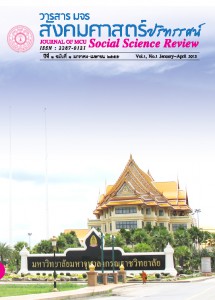รัฐสวัสดิการ สังคมสวัสดิการ หรือ ประชานิยม ทางแยกสามสาย สำหรับเป็นทางเลือกสาธารณชนในประเทศไทย
คำสำคัญ:
รัฐสวัสดิการ; สังคมสวัสดิการ; สาธารณชนบทคัดย่อ
เมื่อวันที่ ๖ สิงหาคม ๒๕๕๓ อดีตนายกรัฐมนตรี อภิสิทธ์ เวชชาชีวะ ได้กล่าวว่า ในอีกหกปี ข้างหน้า ประเทศไทยจะเป็นรัฐสวัสดิการซึ่งจะเปลี่ยนจากแนวคิดแบบประชานิยม แถลงนี้ได้ก่อให้เกิดการ โต้เถียงเชิงขัดแย้งกันมีทั้งฝ่ายที่เห็นด้วยและไม่เห็นด้วย รองนายกรัฐมนตรีในพรรคท่านหนึ่งได้กล่าวโต้ว่า ประเทศไทยคงเป็นรัฐสวัสดิการไม่ได้นอกจากจะเป็นสังคมสวัสดิการ ปัจจุบันประชาชนคนไทยมีโอกาสที่ ยอมรับและได้ประโยชน์จากสวัสดิการสังคมและนโยบายประชานิยมในด้านต่าง ๆ โดยเฉพาะหลังจาก พรรคไทยรักไทยชนะการเลือกตั้งในปี ๒๕๔๔ และเป็นรัฐบาลอยู่จนครบเทอม นโยบายประชานิยมเชิง นวัตกรรมของรัฐบาลได้เอาชนะใจของประชาชนระดับรากหญ้าอย่างกว้างขวาง ปรากฏการณ์ทางการเมืองที่ประชาชนคนไทยเผชิญหน้าอยู่คือ พรรคการเมืองไทยเกือบทั้งหมด ได้เสนอนโยบายประชานิยมเชิงนวัตกรรมต่างๆ เพื่อเอาชนะการเลือกตั้งนี้ คือเหตุผลที่ว่า ทำไมประชาชน คนไทยจำนวนมากจึงเผชิญหน้ากับทางแยก เพราะฉะนั้นเรื่องนี้จึงเป็นเหตุผลของการศึกษานี้ โดยมุ่งที่จะ วิเคราะห์และตั้งข้อสมมติฐานสิ่งที่พบว่า ทางไหนจะเหมาะสมและเป็นไปได้สำหรับประเทศ การศึกษานี้วิธี วิเคราะห์ใช้วิทยาแห่งการแปลตามด้วยสิ่งที่พบด้านความประสงค์และความคิดเห็นดังต่อไปนี้
กลุ่มแรก คิดที่จะทำรัฐสวัสดิการเต็มที่เหมือนสวีเดนโดยไม่คิดถึงฐานปัจจัยต่างๆ ทั้งๆ ที่รู้อยู่ว่าระดับการพัฒนาด้านเศรษฐกิจและการเมืองของประเทศไทยเทียบกับสวีเดนไมได้กลุ่มที่สอง เชื่อว่ารัฐสวัสดิการที่สมบูรณ์สำหรับประเทศไทยสามารถจะทำได้ในไม่ช้า ขึ้นอยู่กับการประเมินต่างๆ เช่น สัดส่วนของรายได้ต่อ จีดีพีกลุ่มที่สาม เสนอว่าสังคมสวัสดิการสังคมจะเหมาะสมกับประเทศ เนื่องจากข้อจำกัดด้านภาษีรัฐบาลก็จะใช้กลไกที่มีอยู่ เช่น กองทุนหมู่บ้านของรัฐบาลทักษิณ เพื่อพัฒนาสวัสดิการสังคม กลุ่มนี้เชื่อว่าสังคมสวัสดิการจะทำให้ประชาชนเกิดความรู้ร่วมกันคิดร่วมกันลงมือทำเลยไม่ต้องรอการช่วยเหลือจากรัฐบาล
กลุ่มที่สี่ เป็นกลุ่มที่พยายามเสาะหาความหมายของนโยบายประชานิยมของพรรคเพื่อไทย กลุ่มนี้มีการแบ่งแยกออกไป วิจารณ์นโยบายประชานิยมของอดีตนายกรัฐมนตรี ทักษิณ ชินวัตร ว่าทำให้ประเทศไทยล่มจมเช่นเดียวกับประเทศอาร์เจนตินา แต่เมื่อมีการเลือกตั้งเมื่อวันที่ ๓ กรกฎาคม ปีนี้ ปรากฏว่าพรรคเพื่อไทยได้ประสบชัยชนะด้วยคะแนนเสียงท่วมท้น กลุ่มนี้จึงจัดสัมมนาเพื่อค้นหาว่า นโยบายประชานิยมของพรรคที่ชนะได้ให้สิทธ์ิอันชอบธรรมอะไรแก่สังคมไทยผลดีที่สุด กลุ่มสุดท้ายเป็นกลุ่มที่ส่งเสริมนโยบายประชานิยมอย่างแข็งขัน กลุ่มนี้ไดพยายามแสดงข้อมูลซึ่งได้จากประสบการณ์เพื่อพิสูจน์ถึงความสำเร็จแห่งนโยบายประชานิยมของรัฐบาลทักษิณ ตั้งแต่ปี๒๕๔๔ ตัวอย่างที่ดีเลิศคือ กองทุนหมู่บ้านหนึ่งล้านบาท นักวิชาการที่เห็นอกเห็นใจมวลชนรากหญ้าที่มาร่วมกับกลุ่มได้แสดงให้เห็นว่า นโยบายประชานิยมของรัฐบาลทักษิณ สามารถเป็นได้ทั้งสองอย่างคือประชานิยมที่เป็นยุทธศาสตร์ทางการเมือง และสวัสดิการสังคมที่เป็นยุทธศาสตร์ทางเศรษฐกิจ จริงๆ แล้วนโยบายประชานิยมต่างๆ ของรัฐบาลทักษิณ ได้จัดตั้งและประสบความสำเร็จเรียบร้อยมาหนึ่งทศวรรษแล้วสรุปว่า สิ่งที่ค้นพบห้าประการข้างบนนี้สรุปได้ว่า ประเทศไทยอยู่ในสภาพทางสามแพร่งให้สาธารณชนเลือกระหว่าง รัฐสวัสดิการ สังคมสวัสดิการ และระบบประชานิยมปัจจุบันประเทศไทยไม่สามารถจะเลือกทางสายใดสายหนึ่งโดยเฉพาะไม่ว่าพรรคการเมืองใดในระหว่างพรรคเพื่อไทยกับพรรคประชาธิปัตย์จะครองอำนาจทางการเมืองนานพอที่จะจัดตั้งนโยบายเหล่านั้น อย่างไรก็ตามไม่ว่าประเทศไทยจะขับเคลื่อนไปถนนสายใดก็ตาม ก็ยังคงต้องการที่จะดำเนินมาตรการที่สำคัญต่างๆ เช่น การปฏิรูปการจัดเก็บภาษีการขึ้นทะเบียนทรัพย์สินที่เก็บภาษีและภาษีมรดก การป้องกันและปราบปรามคอร์รัปชัน เป็นต้น เพื่อที่จะทำให้รัฐบาลไทยในอนาคตใช้บทบาทให้เป็นรัฐแห่งความยุติธรรมไม่แบ่งแยก ปฏิบัติเป็นมาตรฐานเดียวกัน มีเมตตาให้อภัยซึ่งกันและกันจริงๆ จากนั้นรัฐไทยก็จะสามารถใช้บทบาทในการป้องกันและส่งเสริมความเป็นอยู่ที่ดีทางเศรษฐกิจและสังคมของพลเมือง และสร้างโอกาสที่เท่าเทียมกัน กระจายทรัพย์สินที่เที่ยงธรรม และรับผิดชอบต่อผู้ไม่สามารถช่วยตัวเองได้ในเรื่องเสบียงอาหารน้อยเพื่อชีวิตที่ดี นี้แหละคือรัฐสวัสดิการที่แท้จริง
เอกสารอ้างอิง
________ . (2010). “Populist or non populist, equally falling into a puddle”. Posted by admin in economics on 22-07-2010. Retrieved from
www.sarut-homesite.net /ประชานิยม-หรือ-ไม่ประชานิยม/ Retrieved 20-07-2011.
________ . (2011). “Expanding the definition of a populism (the end)”. Retrieved fromww.bangkokbiznews.com/home/detail/politics/opinion/sawai/2011 03:00. Dyer, G. (2008). “Thailand : Populism vs. privilege.” Retrieved from
search.japantimes.co.jp/cgi-bine020080910gd.html./Retrieved 07-09-2011 12:10. En.wikipedia.org/wiki/welfare-capitalism. Retrieved 19-07-2011 16:00 FTA watch. (2011). “‘Rangsan’ criticized Thai society creating myths,
misunderstanding that welfare state good but populism bad”. Retrieved from www.flawatch.org/all/news/19429. Retrieved 19-07-2001 15:52.
Fujimura, M. (2000). The welfare state, the middle class, and the welfare society. Review of Population and Social Policy,(9), 1-23. doi : www.ipss.go.jp/publication/e/R-S-p/NO9_/R-s-P/No9_P1.pdf. Retrieved 02-09-2011.
Gordon, A. and Spicker, P. (1999). The international gossary on poverty. London :Zed Books. Cited in Jaturoang Boonyarattanasoontorn. Welfare state and welfare society : a theoretical perspective. Retrieved from
http://swhcu.net/km/mk_articles/sw_km/.185 welfare-state.html. Retrieved 28-04- 2011 11:26. INN News. (2011). “Triroang said Thailand was not a welfare state”. Retrieved from http://www.showthep.com/shoe-131632. Retrieved 07-08-2011 16:18.
Kampun Yoak. (2011). “Just give access to…” 23-09-2011. Retrieved from www.thairath.co.th/column/pol/kaablook/. retrieved 20-09-2011 09:24.
Manaroangtre chip.V. (2010). “The broken glass:In the next six years Thailand will be a welfare state”. Retrieved from http://corehoononline.com/index.php/2011-03-14-05-46-05/2011-03-14-05- 47- 26/5890-2010-08-09-15-32-46.
News Desk for the Community (2010). “Recovery of Thaksin’s Village Fund as a base for Abhisit’s community welfare”. 12-07-2010. Retrieved from http://www.isranews.org/community-news/ สกู๊ป-สารคดีข่าว/item/1146-2010-07-23-13-4. Retrieved 11-09-2011.
Phusikheaw, M. and Porn pongchotiwit<N. (2011). “Welfare system in the next decade”. Retrieved from www.nesac.go.th/kms/Main_highlight/pdf/NEXT_DECADE_of_soc. Retrieved 13-09- 2011 14:48.
Phutrakul,k. (2010). “Welfare state and the future of the Thai economy”. Retrieved from http://www.bangkokbiznews.com. Posted on 05-07-2010 15:32. Retrieved 25-04-2011 12:13.
Polotical News,Naewna (2010). Abhisit explained “making the welfare state free throughout life in order to cut the use of populist campaigning” 30-06- 2010. Retrieved from http://www.Rut9.com/s/nud/931936.30-06-2010 19:36 “Populism.” En.wikipedia.org/wiki/populism. Retrieved 07-09-2011 11:37.
Pornchoakchai,S. (2009). “Talk about a welfare state with Boonsong Chalethorn”. Retrieved from http://www.vcharkarn.com/vcafe/162527. Posted on 04- 03-2009 11:34.Retrieved 06-05-2011 13:09.
Prachachat (2010). “P.Ch.P.drive-3-way reform system of Anand-Abhisit-Korn” from populism to welfare state. Retrieved from http://www.prachachat.net/view_news. php?newsid=02 po10115075388.sectionid=0202&day=2010-07-15. Retrieved 15-06-2010. Public Communication Subcommittee for Human Rights, National Human Rights in Thailand. “Populism and civil rights in Thailand”.14-07-2011. Posted 17- 07-2011. Retrieved from www.nhrc.or.th/news.php?news_id=8037. Retrieved 17-09-2011 12:19.“Regeringskansliet med departementen” (in Swedisb). Retrieved 26-02-2010. Cited in en.wiki pedia.org/wiki/Swedishwelfare- state. “Socialdepartementets ansvarsomraden” (in Swedish). Retrieved 26-02-2010. Cited in en.wikipedia.org/wiki/Swedish-welfare-state. Social Security office, the Ministry of Labour. (2007). Thailand’s move towards a welfare state.
Suparnaphesuch, V. (2011). “We…believe in Phue Thai’s policies rather than anything else”. Retrieved from vattavan.com/detail.pkp?cont_id=311.Posted on 07- 08-2011. Retrieved 07-08-2011
Thai Free News. (2010). “The Village Fund,Thaksin’s legend,earning more than 30,000 million baht, bad debt only 0.5%” Retrieved from www.thaifreenews.org/?name=analyse&file=readanalyse&id=323. Thai Red Sweden (2011). “Welfare state and reality in Thailand.” Retrieved from www.Thairedsweden.com/2011/06/blog-post-06.html.Retrieved 12-09-2011 18:22.
Wann, M. (1998). “Building social capital” in Jane Franklin (ed). Social Policy and Social Justice. Oxford : Polity Press, PP. 154-165. Cited in Jaturoang
Boonyarattanasoonthorn. Welfare state and welfare so ciety : a theoretical perspective. Retrieved from http://swhcu.net/km/mk-articles/sw-km/185-welfare-state.html. Retrieved 28-04-2011 11:20.
Weiss,S.A. (2007). Thailand’s lesson in populism-Opinion-International Herald Tribune. Retrieved from www.nytimes.com/2007/01/31/opinion/31 iht-edweiss.4417731.html.Retrieved 07-09-2011 15:53.
Wikipedia (2011). “Welfare state,” httw://en.wikipedia.org/wiki/welfare-state. Retrieved28-04-2011 12:24.
ดาวน์โหลด
เผยแพร่แล้ว
รูปแบบการอ้างอิง
ฉบับ
ประเภทบทความ
สัญญาอนุญาต
ลิขสิทธิ์ (c) 2018 วารสาร มจร สังคมศาสตร์ปริทรรศน์

อนุญาตภายใต้เงื่อนไข Creative Commons Attribution-NonCommercial-NoDerivatives 4.0 International License.
เพื่อให้เป็นไปตามกฎหมายลิขสิทธิ์ ผู้นิพนธ์ทุกท่านต้องลงลายมือชื่อในแบบฟอร์มใบมอบลิขสิทธิ์บทความให้แก่วารสารฯ พร้อมกับบทความต้นฉบับที่ได้แก้ไขครั้งสุดท้าย นอกจากนี้ ผู้นิพนธ์ทุกท่านต้องยืนยันว่าบทความต้นฉบับที่ส่งมาตีพิมพ์นั้น ได้ส่งมาตีพิมพ์เฉพาะในวารสาร มจร สังคมศาสตร์ปริทรรศน์ เพียงแห่งเดียวเท่านั้น หากมีการใช้ภาพหรือตารางหรือเนื้อหาอื่นๆ ของผู้นิพนธ์อื่นที่ปรากฏในสิ่งตีพิมพ์อื่นมาแล้ว ผู้นิพนธ์ต้องขออนุญาตเจ้าของลิขสิทธิ์ก่อน พร้อมทั้งแสดงหนังสือที่ได้รับการยินยอมต่อบรรณาธิการ ก่อนที่บทความจะได้รับการตีพิมพ์ หากไม่เป็นไปตามข้อกำหนดเบื้องต้น ทางวารสารจะถอดบทความของท่านออกโดยไม่มีข้อยกเว้นใดๆ ทั้งสิ้น





